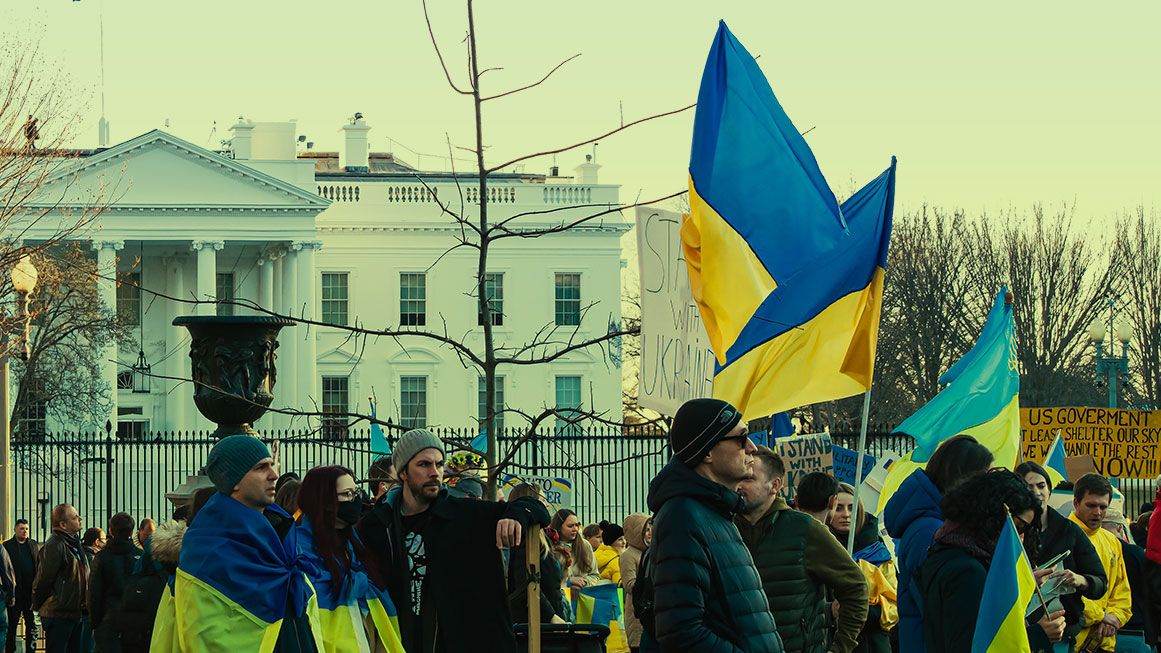Debate: The U.S. Should Increase Funding for the Defense of Ukraine
Does Ukraine face an existential risk? Does it matter?

Ukraine's Liberal Democracy Deserves Our Aid
Affirmative: Cathy Young

The Biden administration announced a $2.2 billion aid package for Ukraine in February. It includes, among other things, longer-range bombs than the ones Ukraine has received until now.
In a sense, the question of whether the U.S. should be giving Ukraine more money is moot: Even among Republicans, pushed by circumstance into the more dovish position in this conflict, support for military aid remains strong. But does aid to Ukraine, broadly, make the world more free?
This question goes to a fundamental tension in the liberty movement. There is the impulse to adamantly oppose interventionism (particularly of an overtly military nature) as fundamentally connected to outsized government, and there is the impulse to support liberty not only in the United States but all over the world. The disastrous outcome of the war in Iraq, which initially had some support in the liberty camp, turned out to be a death knell for pro-liberty interventionism.
But Ukraine differs from Iraq in a number of key ways. No U.S. troops are directly involved in fighting. (Their most direct participation is training Ukrainian soldiers.) The indirect U.S. and NATO involvement is in response to foreign aggression against Ukraine. And while the cause of "democracy promotion" in Iraq always rested on dubious speculation about the country's potential to become a model democracy in the Middle East, Ukraine has already paid its dues as a would-be liberal democracy. Unless one buys into Kremlin narratives about the 2014 "U.S.-sponsored coup," which reduce mass protest to puppetry, it is clear Ukrainians have collectively cast their lot with liberty.
Obviously, this doesn't mean that Ukraine—which was the target of eight years of low-level warfare by Russia before full-scale war began—is a perfect liberal democracy. For that matter, most liberal democracies today are nowhere near "perfect" free societies. But the choice Ukraine made in 2014 was to join the (imperfectly) free world, even if some of the people who fought for its revolution were far-right nationalists.
What's happening in Ukraine right now is simple: An aggressive authoritarian state—one whose leadership, whether for ideological or opportunistic reasons, has been actively seeking to promote authoritarianism beyond its borders—is trying to crush an aspiring liberal democracy. Russia's "security interests" amount to the claim that it cannot be secure unless it can impose its diktat on its neighbors. And its claim of rescuing ethnic Russians in Eastern Ukraine from persecution is preposterous, considering that Russia and its proxy "insurgents" are the ones who have consistently put that population in danger.
Does it matter to liberty-loving Americans whether there is more liberty and human dignity around the world, or more authoritarianism and brutality? I would argue that it does. In a world made small by instant long-distance communication and shrinking travel time, the creep—or march—of illiberalism around the world affects us. That doesn't mean we should actively "export democracy." But when other countries are exporting autocracy and barbarism, we can step in at least to the extent of helping their victims. It is telling that so many opponents of military aid, even those who profess principled noninterventionism, so often end up recycling anti-Ukraine slanders (the neo-Nazi menace, for example) to undercut Ukraine's claim to sympathy. When it's just the facts, Ukraine looks eminently deserving.
Yes, other allies need to pitch in more. But we, too, need to give enough—and fast enough—to allow Ukraine a meaningful victory, not just an endless slog. And while we're at it, to send the strong message that nuclear blackmail doesn't work.
Spending Tax Dollars on Ukraine Increases U.S. Risks
Negative: William Ruger
The United States should not increase its funding to Ukraine. Doing so is unnecessary to meet our vital national interests, would require spending further taxpayer dollars disconnected from the purpose of just government, and could seriously harm our security.
America's national interests are minimally implicated by the war. The most serious threat posed is that the U.S. and Russia would find themselves in an escalatory spiral leading to a nuclear exchange. While the odds of that may seem low, risk is probability multiplied by consequences. We are talking about huge risks and thus should be cautious about supporting Ukraine in a way that could get the U.S. into such a spiral. Increased funding heightens that danger, especially if it helps Ukraine threaten Russian territory.
The increased risk might be justified if the stakes of the war were high. That is just not the case for the U.S., even if it is existential for Ukrainians. Outside of the nuclear realm, Russia is not much of a threat to us. We are a superpower and dwarf Russia economically and militarily. The U.S. enjoys a robust nuclear deterrent, which practically guarantees our territorial integrity. We also have powerful conventional capabilities, and our allies in Europe could alone balance Russian power. Russia has clearly shown its relative weakness, performing poorly on the battlefield and being unable to defeat a much smaller country on its doorstep. We don't need to worry about it marching across a more powerful Europe.
Right now, Ukraine's existence isn't at grave risk. But even if Russia could conquer its neighbor, we lived with and even won the Cold War when Ukraine was part of the much more powerful Soviet Union. For Russia, a victory would entail a high cost and the spoils would be a wrecked Ukraine. Forgive me if I don't accept the argument that Ukraine is fighting for our freedom, even as I am impressed by the bravery and fighting skill of its citizens.
That leaves three possible rationales for increasing our funding: that it is a reasonable cost to pay to bleed the Russians, that it would help support a valuable sovereignty norm, or that it could help a more liberal Ukraine to win back its territory.
The first isn't compelling because we'd be spending billions more of coerced taxpayer dollars to marginally harm a Russia that isn't a grand threat outside the nuclear realm, while increasing the risk of nuclear war. A strategy to bleed a rival in a proxy war isn't the worst approach, especially to turn around an unfavorable balance of power. But trends favor us, not Russia. Those who actually care about Ukrainians might also find this too cynical an argument since we'd be effectively bleeding Ukraine to undermine Russia in the process.
The second we could take more seriously if the U.S. actually upheld this norm consistently, or if we could entrust to the norm our future security. But is it worth the risks involved as opposed to relying primarily on our own hard power?
The third also fails for true liberals, because the proper role of a just state is to protect the rights of the members of its political community. It does so legitimately in foreign affairs when it secures and advances the national interests: our territorial integrity, the conditions of our economic prosperity, and our constitutional order. Trying to protect the rights of others, disconnected from what is required for our interests, is beyond the scope of what a just state entails.
This is especially bad for political justice when such actions significantly increase the risk that we will be dragged into a nuclear or conventional war while requiring greater taxation. Even assuming Ukraine is a paragon of liberalism (which it isn't), that isn't enough to warrant sending more American tax dollars overseas and increasing the risk to our vital interests.
Subscribers have access to Reason's whole May 2023 issue now. These debates and the rest of the issue will be released throughout the month for everyone else. Consider subscribing today!
- Debate: It's Time for a National Divorce
- Debate: Artificial Intelligence Should Be Regulated
- Debate: Democracy Is the Worst Form of Government Except for All the Others
- Debate: To Preserve Individual Liberty, Government Must Affirmatively Intervene in the Culture War
- Debate: The E.U. Was a Mistake
- Debate: The U.S. Should Increase Funding for the Defense of Ukraine
- Debate: Mentally Ill Homeless People Must Be Locked Up for Public Safety
- Debate: Despite the Welfare State, the U.S. Should Open Its Borders
- Debate: Cats Are More Libertarian Than Dogs
- Debate: Make Housing Affordable by Abolishing Growth Boundaries, Not Ending Density Restrictions
- Debate: Bitcoin Is the Future of Free Exchange
- Debate: Be Optimistic About the World


Show Comments (95)